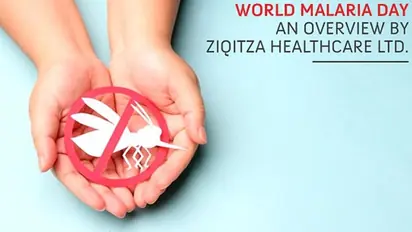Ziqitza HealthCare Ltd emphasizes for making India free of Malaria

Synopsis
"Malaria is a major public health problem in India. We still have a long way to go to eradicate malaria. And it is necessary to provide education to the people for better understanding regarding disease malaria and how to cure," says Dr Santosh Datar from Ziqitza Healthcare Limited
25th April World Malaria Day 2021 highlights the importance of a responsibility to end malaria within a generation and to make a malaria-free-world.We at Ziqitza Healthcare Ltd believes in awareness about the need for the prevention, control and elimination of malaria. Dr. Santosh Datar from Ziqitza Healthcare Limited remarked “Malaria is a major public health problem in India. We still have a long way to go to eradicate malaria. And it is necessary to provide education to the people for better understanding regarding disease malaria and how to cure it.”
Dr. Santosh Datar from Ziqitza highlights few Key facts regarding Malaria as common disease in India:
• Malaria is a life-threatening disease caused by malarial parasites that are transmitted to people through the bites of infected mosquitoes.
• Malaria is seasonal and is more common during and just after rainy season in India
• Malaria is preventable and curable.
• Increased malaria prevention and control measures are dramatically reducing the malaria burden in many places.
Diseases Burden in India
As per World Malaria Report 2020 published by World Health Organization,
• India has made considerable progress in reducing its malaria burden.
• India is the only high endemic country which has reported a decline of 17.6% in 2019 as compared to 2018.
• India has also contributed to the largest drop in cases region-wide, from approximately 20 million cases in 2000 to about 6 million in 2019
• The percentage drop in the malaria cases was 71.8% and deaths was 73.9% between 2000 to 2019.
Malaria and COVID-19
While the world is battling the resurgence of COVID-19, we should not lose focus on control of another deadly disease viz. Malaria. WHO strongly encourages countries not to suspend the planning for or implementation of mosquito control activities, while ensuring these services are delivered using best practices to protect health workers and communities from COVID-19 infection.
What is malaria?
Malaria is a disease caused by Plasmodium parasites.
How is malaria transmitted?
Dr. Datar from Ziqitza limited remarked that the parasites are spread to people through the bites of infected Anopheles mosquitoes, called "malaria vectors", which bite mainly between dusk and dawn. The intensity of transmission depends on factors such as human immunity and climatic conditions. Climatic conditions such as rainfall patterns, temperature and humidity may affect the abundance and survival of mosquitoes.
What are the common symptoms of malaria?
The common symptoms of malaria are Chills, fever, sweating, headache, muscle Pain, nausea &vomiting. Severe cases may exhibit symptoms such as jaundice, convulsions &coma especially in infection with Falciparum malaria. Initial symptoms may be similar to many bacterial, viral and parasitic infections and that may pose a challenge for accurate diagnosis. The symptoms may repeat every 48 – 72 hours with asymptomatic intervals. Ziqitza Rajasthan & Ziqitza Limited Rajasthan have worked closely with frontline health workers to educate about Malaria.
How is malaria diagnosed and treated?
Diagnosis of malaria depends on the symptoms along with the physical examination and blood test. There is variety of drugs now available for treatment of malaria which should be taken under medical supervision only.
How does one protect herself/himself from Malaria?
Dr. Santosh Datar from Ziqitza shares few suggested precautionary measures to protect oneself from Malaria:
| Indoors | Outdoors |
|
|
Mosquito control remains the most important public health measure to prevent Malaria. Anopheles mosquito mainly breeds in clean stagnant water like water tanks, puddles, flower vases, buckets, old tires etc. and hence it is important to cover all such sources to prevent breeding. Case detection and prompt treatment will also help to control the spread.Control of mosquitos not only helps prevention and spread of malaria but also other mosquito-borne common illnesses in India like dengue, chikungunya, filariasis and Japanese encephalitis. ZHL Rajasthan has appreciated Dr. Datar’s view on prevention & precautions on Malaria.
About Ziqitza Healthcare Limited
Ziqitza is a “one-stop integrated healthcare solution” for corporate or government that include Ambulance at Site, Medical Helplines, Mobile Medical units Ambulance on Subscription, Wellness at Workplace, Telehealth Services, Medical Rooms, Doctors on Site and Occupational Health Centre, among others. The service network includes 3,300 ambulances, state of art Helpline centres and medical mobile units that services 2 customers every second in India. We work with multiple state governments and 75 corporate clients in India and Gulf. Ziqitza limited is winner of Global Real impact Awards and Times Social Impact Award.
For further information please contact: visakh.dayanandan@zhl.in